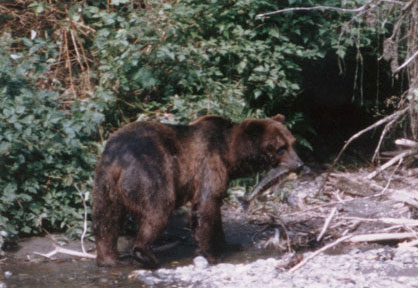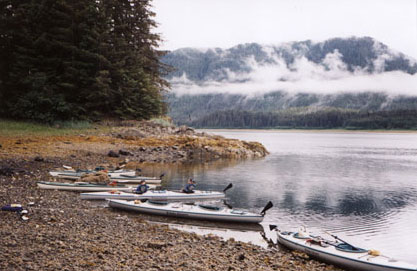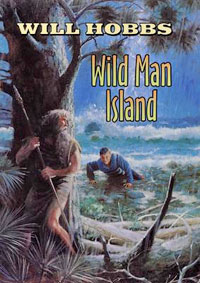 |
Yes, and I hope to again. Several years before I ever thought of writing a sea kayaking story, my wife, Jean, and I went on two kayak trips in southeast Alaska, in the vicinity of Juneau. The first was a six-day trip along the shores of Chichagof Island, across the Icy Strait from Gustavus, Alaska. It was focused on seeing the marine mammals. The second was to Admiralty Island in the vicinity of Pack Creek, where we were able to observe brown bears (coastal grizzlies) at a salmon stream. Here's a picture from our trip of a big “brownie” who's just caught a salmon.
Did you go by yourselves? No way. Our river-running experience, we knew, would be of little use dealing with the huge tidal currents and fluctuations. We knew from reading about them that those waters can be extremely hazardous. For the first time ever, rather than going it on our own, we joined a commercial trip. Our group leader and our naturalist for the Chichagof Island trip, both women, became the inspiration for their fictional counterparts a few years later when I decided to write a story that begins with a kid who's on such a trip. Did you have all the camping gear for the trip in your kayaks, like Andy's group did in Wild Man Island? Just like that. It's amazing how much gear you can stow in a good sea kayak, and how stable those kayaks are. Here's a picture of our kayaks pulled up on a gravel beach.
Are Andy's kayaking experiences in Chapter One based on yours? Very much so. We were so close to breaching humpback whales, the guides told us to tap on the hulls of our kayaks to signal our location to them, so they wouldn't accidentally come up underneath us. Several times we were joined suddenly by rowdy groups of snorting Steller's sea lions, who behaved as described in Wild Man Island. Our group leader told us that another adventure company the summer before had one of its kayaks tipped over by a Steller's sea lion. Are there other things in Wild Man Island that came from your sea kayaking trips? Lots of little things, for example, learning that almost every blueberry has a little larva in it. That kind of detail is wonderful when you're writing a story. It's so vivid, and lends authenticity. Andy's from western Colorado and you're from Colorado. Andy's a river runner and so are you. Andy's memories of backpacking in the Colorado Rockies and river running on the Colorado River downstream of Grand Junction are mine, of course, even though Andy isn't me. Andy's last name, by the way (Galloway), is a tip of the hat to a school librarian in the Grand Junction area who has been a big proponent of my books since they first started to appear. Why does Wild Man Island begin on Baranof Island? Baranof is where Andy would have to start if a windstorm was to sweep him across the strait and onto the foot of Admiralty Island. I spent a whole lot of time poring over the maps and figuring out how the survival portion of the story would play out, and where. I wanted Andy to come across the abandoned settlement of Tyee, and end up at Pybus Bay. I had learned from a geologist who works for the U.S. Forest Service that there was karst limestone in the vicinity of Pybus Bay, and therefore the strong possibility that there are undiscovered caves there. I could foresee Andy getting inside an extensive cave system and making a fabulous discovery. Wild Man Island has a lot to do with archeology. How did that get started? I got all excited about the breakthroughs happening in the 1990s in regard to the earliest Americans. We've all been taught that the first people on the continent walked across the land bridge between Siberia and Alaska about twelve thousand years ago. They were the mammoth hunters we call the Clovis people. We learned that they made their way south through a corridor that opened up in the ice sheets, populating what's now the United States, then Mexico, then Central America and South America. When discoveries were made way down in Chile, in South America, of people who had been there before the land bridge and the corridor even opened up, that caught my attention. This was fabulous. What a mystery! How did they get there? Then came discoveries in Pennsylvania and Virginia that pushed the date of people in the Americas back to seventeen thousand years ago. That's when you decided to write a book? Not yet. I was just wildly interested. Then came the discovery, in caves on Prince of Wales Island in southeast Alaska, that the big islands offshore of Alaska and British Columbia were not entirely encased in a thousand feet of ice during the last Ice Age, as was previously thought. Some areas were ice-free and teeming with bears, caribou, salmon, all sorts of other animals, continuously, for forty thousand years! It meant that those earlier people who had entered North, Central, and South America could possibly have traveled from Asia by boat, island-hopping their way around the rim of the northern Pacific! This was incredible stuff. That the newest discoveries were being made in Alaska, close to where I had been sea kayaking, was a coincidence that seemed gift-wrapped with my name on it. I began to think in terms of a story. Here was the opportunity to include my readers in the excitement. I knew I would learn a lot along the way. I talk about this in my Author's Note at the end of Wild Man Island. Have you been caving, or did the background for that part of your story come from books? It came from both. I wanted fresh experience in caves to add to childhood visits to Carlsbad Caverns in New Mexico, and caves in Oregon and South Dakota. My brother Joe, who leads cave expeditions in Missouri, guided me into a cave in that state, and I toured a cave on Vancouver Island in British Columbia. Also, I collected a number of books and videos about caves and caving. Where did the wild man come from? From my imagination. I've often wondered if it would be possible to live by prehistoric means. I explored that fantasy through the wild man. I’d never try it in real life. I’d miss people too much |
|


